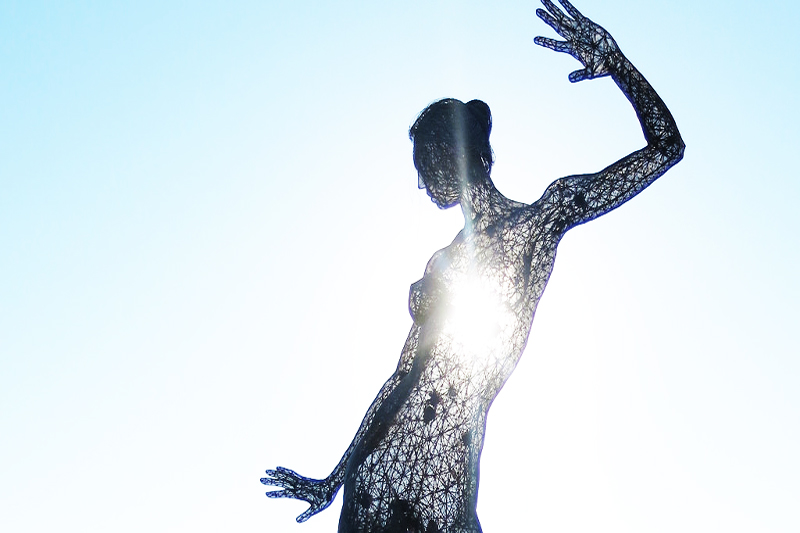Our deck is the human deck we are dealt, and when we project fantasies and assumptions of transcendent perfection by comparing our lives to those of strangers we don’t even know, it can be dangerous.
This culture assumes celebrities have the life we want, casting them into a perfect role in our minds, into a fantasy life that is elusive for us “regular folks.” Nothing could be further from the truth, because they are human too, and humans are always going to be jagged and rough around the edges.
In the past, I had often rejected the deck I was dealt by my Mother in the Sky, wishing I was less queer and less challenging. I denied the gifts I was given and instead wished I were like other people, like the people I projected fantasies onto, assuming that if I were like them that my life would be so much better.
Even as recent as this past Labor Day weekend, I was guilty of casting assumptions onto total strangers when I saw a drop dead gorgeous black girl sitting at the bar, her giggles and seductive gestures turning her boyfriend on as they shared a deep conversation.
I immediately imagined her life as equal in caliber to Jada Pinkett Smith or Halle Berry, and that this couple would finish their drinks, make it home and kiss with wild passion and make love all night, with her body throbbing in unison with his loins as they both screamed in ecstasy. Her body raw and receptive in cuddles from his arms as they basked in the warm afterglow of his muscular torso with shared giggles and the joys of glistening skin.
I chalked the possibility of that powerful lovemaking up as a certainty for this beautiful black girl because she had a factory made pussy as a cisgender woman and I was issued a large clit in the form of a penis as a transgender woman. She was the favorite, she was the one who would always win in a battle of the sexes, and she had the perfect life while my life was shit. She would get married and live happily ever after, while I would die alone, a bitter spinster with resentful sentiments.
Then a groovy song came on over the speakers and interrupted my projection about this black woman whom I knew nothing about. Her boyfriend grabbed her and said “I like this song, let’s dance,” and proceeded to twirl her on the dance floor.
It was at that moment when I noticed her playful and seductive self-disappeared, replaced now by a million-mile stare. She had zoned out, almost as if she was putting up with him grinding her on his thigh as he showed her off to the crowd, waiting for the moment to be over so that she could get back to what she really wanted: emotional connection and a sense of feeling mirrored with intimate conversation at the bar.
It is common for men to trade giving emotional attention for sex, and women trade giving sex for emotional connection.
This couple had strong chemistry and sparks while sipping their drinks at the bar, their flirtatious energy obvious and radiant. But I assumed they had a perfect sex life, and on top of that assumption, I projected the conclusion that it was perfect solely because she was straight and cisgender while I was queer and transgender.
My life, so I thought, would be so much better if I were straight – if I was cisgender. My life would have been perfect had I been born female. I fell into the “if only” mode, and my ego used all the dirty tactics of 37 years to convince me that being transgender was something to reject, something to feel sick about, something to use to validate my shame.
The truth is, my jealousy of her being straight and seeing her with a guy, is easily reversed if I imagine myself with my lesbian friends at a queer bar or recall the countless times I was treated like a queen with gentlemen that appreciated my transgender history.
I never stopped to think about the positive aspects in my life, the flipside of my negative coin, instead focused on what I didn’t have, what I felt the world owed me.
I entered princess mode and that wasn’t attractive at all, forgetting about how queer women and men fawn over me and chose instead to blame my singlehood on being transgender rather than empowering myself by pointing out the blockages and obstacles I put in place to prevent myself from connecting and dating other people.
Our deck is the human deck we are dealt, and when we project fantasies and assumptions of transcendent perfection by comparing our lives to those of strangers we don’t even know, it can be dangerous.
I saw a Facebook post the other day about Brad Pitt and Angelina Jolie splitting up, and a friend said that she had now lost hope in her own possibility of finding lasting love because, in her mind, “if even a power couple eventually gets divorced,” how was her relationship to stand any chance?
It’s easy to proclaim and assume that other people’s failures are indicative of our likelihood of failure, but there is no causality or linkage except the fact that we projected a story about people we know very little to nothing about, onto our own powerful and potent life.
In the end, they may be celebrities, but their deck is the same as our deck: a human deck we were dealt, and when we project fantasies and assumptions of transcendent perfection by comparing our lives to those of strangers we don’t even know, it is dangerous.
